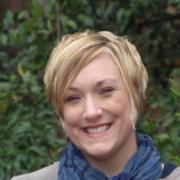Innovative Pastor Helps Refugees Help the U.S. Economy
Date: June 13, 2017
This year, former pastor Leah Lonsbury opened Just Bakery, an Atlanta nonprofit that provides job training, food service certification, and a living wage for resettled refugees.

Lonsbury isn’t the first to turn to baking to make change. She used to live in Madison, Wisconsin, where a good friend runs a nonprofit bakery that trains and educates former inmates to help them find work after prison, an effort also aimed at reducing recidivism rates. “It was the first time I saw someone use the marketplace creatively to open doors for vulnerable populations,” Lonsbury says. “They did it by addressing financial and vocational hurdles, and the results were powerful . . . and delicious.”
Lonsbury has long been drawn to service work; it’s why she went to seminary. “All of us are beloved children of God, who deserve a chance to thrive and live in peace,” she says. With the world’s refugee population growing exponentially, and nearby Clarkson, Georgia, at the heart of national resettlement efforts, she is tweaking the Just Bakery model to focus specifically on refugees. She hopes to have four resettled refugees on staff within a year of opening.
Lonsbury has seen how well refugees do when given such opportunities. In early 2017, her church contacted the International Refugee Committee (IRC) and offered to resettle a Muslim family. The IRC identified a family in need of asylum: An Afghan man who, because he had worked for U.S. government contractors, was being targeted by the Taliban, and his wife and their two small children. Prior to their arrival, the family had spent years in hiding.
The family brought considerable skills and experience to America. Both parents were fluent in five languages, including English, and the father had spent 15 years working on large-scale infrastructure projects. In Atlanta, he found work in resource management and logistics, and he also volunteers at immigrant and refugee agencies. His wife, who plans to attend college, hosts dinners for congregants at Lonsbury’s church. “That’s an opportunity she didn’t have in Afghanistan,” Lonsbury says .
New American Economy research shows that many immigrants are similarly motivated and resilient. In fact, refugees constitute a particularly industrious segment of the foreign-born population. In 2015, 13 percent of refugees were entrepreneurs, compared with 11.5 percent of non-refugee immigrants and just 9.0 percent of the U.S.-born population. When granted initial assistance upon arrival in the United States — as Lonsbury is doing — they tend to grow household income at comparatively faster rates than other foreign-born groups, allowing them to distribute more money through the economy and to pay more in taxes, thus making vital contributions to government services and entitlement programs such as Medicare and Social Security. In 2015, refugees in the United States earned more than $77 billion in household income and paid almost $21 billion in taxes. In 18 states alone, including Georgia, where Lonsbury runs her bakery, refugees hold more than $1 billion in spending power.
Lonsbury believes it’s to everyone’s benefit to support immigration reform that would help put an end to fear-based restrictions, particularly of refugees who have served the United States abroad. “Refugees are the most well-vetted people in the world,” she says. “They face intense scrutiny into every part of their lives when they apply to come here. So, instead of limiting their numbers, I would swing that door wide open.”
